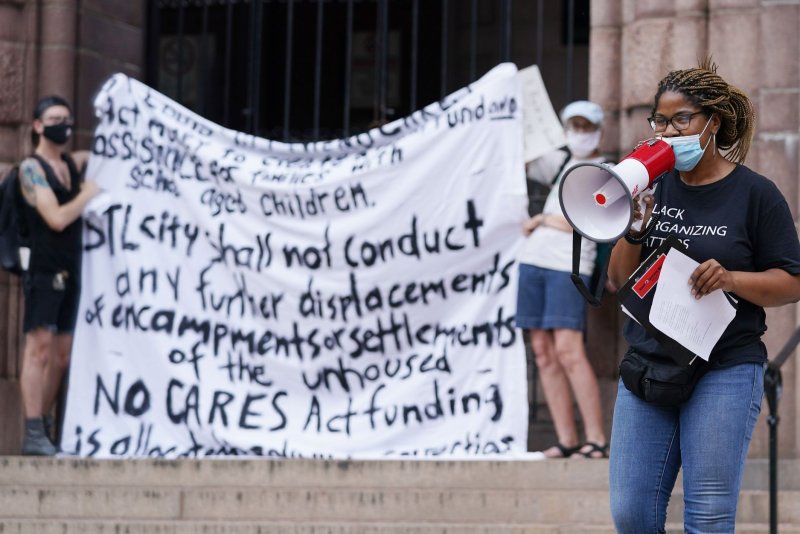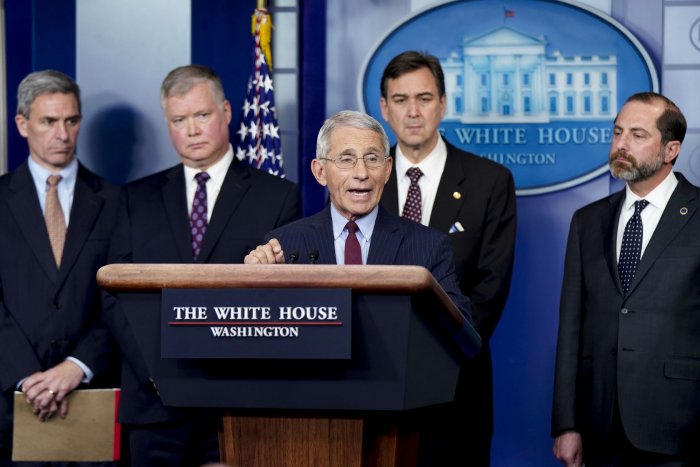Activists rally outside of City Hall in St. Louis, Mo., on July 7, 2020, to oppose evictions in the city for residents who have been severely affected financially by the coronavirus pandemic. File Photo by Bill Greenblatt/UPI |
License Photo
March 29 (UPI) -- The Centers for Disease Control and Prevention moved Monday to extend a national ban on evicting renters who are experiencing hardship related to COVID-19, just two days before it was set to expire.
The moratorium, ordered by the CDC after the pandemic arrived last year, was scheduled to expire on April 1. The agency's move on Monday pushed back that date to at least July 1.
Surveys by the Census Bureau have shown that hardship from the pandemic has affected the ability of tens of thousands of renters nationwide to pay their rent.
"The COVID-19 pandemic has presented a historic threat to the nation's public health," CDC Director Dr. Rochelle Walensky said in a statement.
"Keeping people in their homes and out of crowded or congregate settings -- like homeless shelters -- by preventing evictions is a key step in helping to stop the spread of COVID-19."
The CDC said it wants to avoid displaced people from moving in with family members or friends, or being forced into crowded homeless shelters.
"When you're looking at an infectious disease like COVID-19, evictions can have an impact not only on the health of evicted families, but also on the health of the broader community," University of California, Los Angeles researcher Kathryn Leifheit, part of a study last fall that found a strong link between evictions and new coronavirus cases, told CNBC.
Forty-three states and Washington, D.C., barred evictions for a time last year, some of which were a short as 10 weeks. Allowing evictions to continue in those states caused as many as 433,700 additional cases and 10,700 additional deaths between March and September, the researchers found.
President Joe Biden's administration said Monday that several federal agencies are coordinating to support the eviction ban and help renters with hardship. The White House said the efforts are being undertaken at the Treasury Department, Department of Housing and Urban Development, Department of Agriculture, Consumer Financial Protection Bureau and the Federal Trade Commission.
The FTC will monitor and investigate eviction practices to ensure companies and landlords are complying with the law the White House added.
Tenants can learn about eviction and debt collection rights and how to get help with housing costs at the CFPB website.
Earlier this month, a federal judge in Ohio ruled that the CDC doesn't have authority to order the ban on evictions. The ruling was the result of a lawsuit filed by a group of landlords and property owners.
The judge, however, stopped short of granting an injunction to stop the CDC from enforcing the moratorium.
The Justice Department has said it will appeal the ruling, as well as a similar ruling in Texas in February.
January 31, 2020
National Institutes of Health official Dr. Anthony Fauci (C) speaks about the coronavirus during a press briefing at the White House in Washington, D.C. Health and Human Services Secretary Alexander Azar (L) announced that the United States is declaring the virus a public health emergency and issued a federal quarantine order of 14 days for 195 Americans. Photo by Leigh Vogel/UPI |
License Photo
















